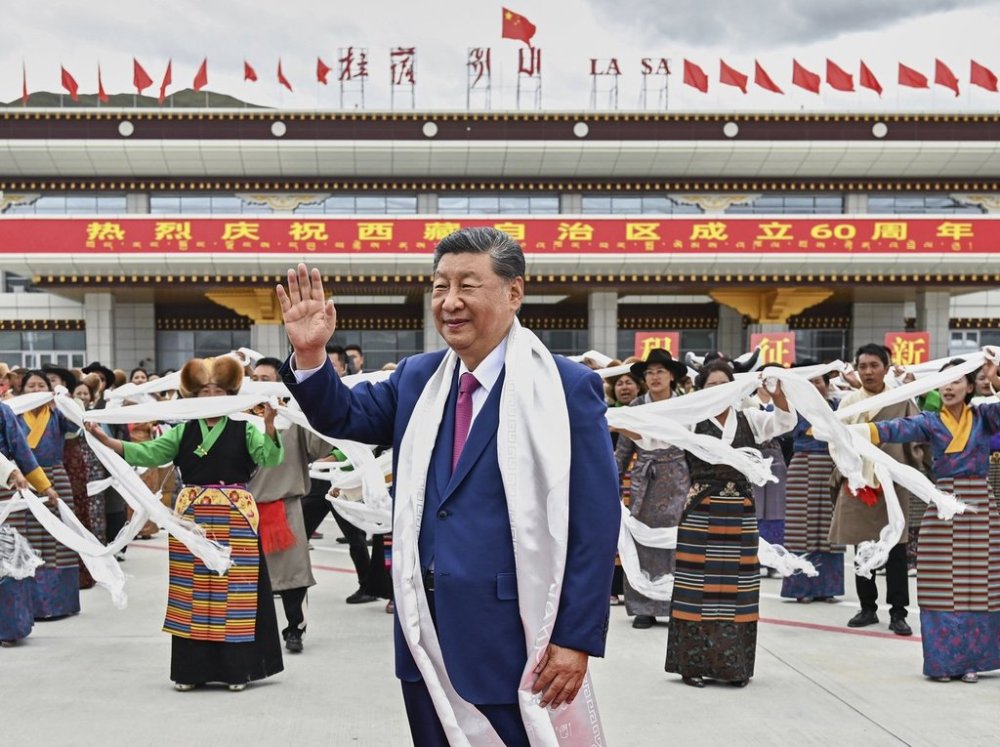Grand ceremony and parade mark 60 years of Chinese Communist Party rule in Tibet
Advertisement
Read this article for free:
or
Already have an account? Log in here »
To continue reading, please subscribe:
Monthly Digital Subscription
$0 for the first 4 weeks*
- Enjoy unlimited reading on winnipegfreepress.com
- Read the E-Edition, our digital replica newspaper
- Access News Break, our award-winning app
- Play interactive puzzles
*No charge for 4 weeks then price increases to the regular rate of $19.00 plus GST every four weeks. Offer available to new and qualified returning subscribers only. Cancel any time.
Monthly Digital Subscription
$4.75/week*
- Enjoy unlimited reading on winnipegfreepress.com
- Read the E-Edition, our digital replica newspaper
- Access News Break, our award-winning app
- Play interactive puzzles
*Billed as $19 plus GST every four weeks. Cancel any time.
To continue reading, please subscribe:
Add Free Press access to your Brandon Sun subscription for only an additional
$1 for the first 4 weeks*
*Your next subscription payment will increase by $1.00 and you will be charged $16.99 plus GST for four weeks. After four weeks, your payment will increase to $23.99 plus GST every four weeks.
Read unlimited articles for free today:
or
Already have an account? Log in here »
BEIJING (AP) — With leader Xi Jinping looking on, China marked 60 years of Communist Party rule in Tibet on Thursday with speeches and a parade in front of the 17th-century Potala Palace, the home of the Dalai Lama until he fled to India in 1959.
Speakers hailed economic development in the remote region in the foothills of the Himalayas and stressed the need to fight separatism. Opposition to Chinese rule has been largely quashed by a decades-long campaign of repression that has imprisoned Buddhist monks and demolished some monasteries.
“Tibetan affairs are China’s internal affairs, and no external forces are permitted to interfere. All schemes to split the motherland and undermine stability in Tibet are doomed to fail,” senior Communist Party leader Wang Huning told a crowd of 20,000 flag-waving people in a large public square.

Communist forces occupied Tibet in 1951, two years after emerging victorious in a civil war and taking control of China. The anniversary marked the government’s establishment of the Tibet autonomous region in 1965. It is called Xizang in Chinese.
The parade, along a wide avenue between the square and a covered stage for special guests, included floats highlighting the regions of Tibet and large dance troupes that stopped in front of the square to perform. Troops and police marched in formation, shouting out their mottos. Others held up wide banners that proclaimed Communist Party slogans.
“The great achievements of the Tibet autonomous region over the past 60 years fully demonstrate that only under the leadership of the Communist Party of China … can Tibet achieve prosperity and progress, create a bright future, and enable people of all ethnic groups in Tibet to live a happy and healthy new life,” Wang told the gathering.
The 13-story Potala Palace, now a tourist site, provided an impressive backdrop from its perch atop a rocky outcropping in Lhasa, the capital of Tibet.
The Dalai Lama, who recently turned 90, still lives in India and is the spiritual leader of Tibet. China considers him a threat and says it has the right to appoint his reincarnation after his death. Many overseas Tibetans are critical of Chinese rule and a government-in-exile has been set up in the mountainous Indian town of Dharamshala.
The Free Press acknowledges the financial support it receives from members of the city’s faith community, which makes our coverage of religion possible.


